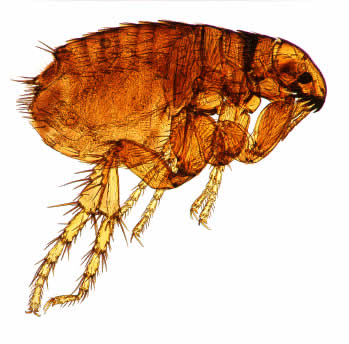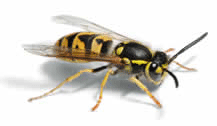Bristol
Flea Treatments
Bristol Pest Control
Eliminate Cluster Flies: CALL - 0117 303 5181

Flea Treatment Facts & FAQ's
Fleas have been around for millions of years and with around two thousand species worldwide you can't help respecting these adaptable little offenders.
Fleas and Flea Treatments
Flea Treatments: Fleas are distinctive from other insects in a number of key ways - fleas are quite small, flattened insects that are a few millimetres long, appearing brown in colour, with backward facing hairs that allow them to move easily through the victims (hosts) hair where they feed on the hosts blood.
The other significant features are the incredible jumping range and a distinctive dark brown to black eye on the head. In the picture above you can clearly see the powerful rear legs and claws on the ends of the legs for grasping the hosts flesh, ensuring they have a firm purchase whilst they feed. The human flea (Pulix irritans) is larger than these more commonly found fleas but must not be underestimated.
Fleas are among our least favourite pests and it is dog fleas (Ctenocephalides canis) and cat fleas (Ctenocephalides felis) that are most commonly responsible for bites here in Bristol, but if you think it is just one person in your home getting bitten then you are likely to be wrong. This simply means that they are not reacting to the bites in the same way and have no allergy to them.
Fleas also carry a number of diseases that include the Black Death a very frightening disease still around today in some of our planets poorer countries. Bacteria are spread when the flea regurgitates whilst feeding on a new host. One key problem with flea bites is the allergy many people have to them. The bites get itchy and the scratching causes infection that in turn can cause permanent scarring. Fortunately at WaspKill UK we have proven methods for controlling fleas quickly, safely and easily.
large infestations can develop whilst peoples homes are empty and we get called to people each year who have returned home to become covered in pepper from the carpet or in other words hundreds of fleas all emerging from the floors etc simultaneously. The flea's astonishing ability to jump 100 times its own height, allows it to easily make it onto a passing host. What's interesting is they only jump when it's light.
The products you can buy in the shops can have some effect but in general are a sorry match for the for large infestations that are only quickly taken care of by integrated methods that include both fumigation and residual sprays.
Flea Treatments for cat fleas and dog fleas:
Flea treatments for cat fleas and dog fleas that are easily available to the general public are very expensive and in most cases simply do not work. We regularly have customers who spend a hundred pounds or more on sprays form the supermarket or vet that just don't get the results they promise. Our products are varied and this is because every situation is slightly different. Professional products get good results in the majority of cases and from experience we know that the chemicals we use are quite simply the very best.
Common Sources of Fleas:
One of the big questions our customers often ask in relation to fleas affecting the homes or offices is very simply "where do fleas come from"?
For the answer you need to engage in a small amount of detective work. You need to think when you first started experiencing the symptoms of bites, such as raised itchy patches on the skin or others in the same area reported seeing them or getting bitten by them. Once you have a little bit of a time line you need to ask some of these questions and of course give honest answers.
Where did I first notice fleas or the flea bites on my body?
The legs and lower arms are common places especially where the skin is delicate with a good vascular supply close to the surface. The neck is also a common spot to get bitten. Clothing is a great insulator and also provides fleas with a level of concealment.
Where was I when I noticed the fleas?
What had you been doing that day? Had you had any visitors or had anyone else in that location? Had you been into a property or area where animals were or had been present? Had you been into a squat or old property where an animal had been kept up to eighteen months before?
What time of day was it when I noticed the fleas?
Was the weather hot or cold - was it day or night. Like all insects, fleas like warmth and if you are the warmest thing in a cool room then your heat signature alone will get them interested. If the room is warm or an area is exposed to sunlight through glass, then it speeds up the development time it takes for flea larvae to reach maturity or developing adults in pupae to mature.
Do you have any pets that have not recieved flea treatments?
Cats and dogs are often the source of fleas - however you also find that rabbits and other animals that frequent your garden will also leave these little critters for you to pick up. It is not uncommon for fleas to be present in one corner of the garden where badgers, hedgehogs or foxes are regularly seen at night or perhaps in the case of foxes, during the day. Sadly it is often children who get bitten first as their skin is delicate and untainted with strong perfumes or aftershaves.
Pets that come into your homes and offices are also commonly responsible for infestations, and if you have a cat flap installed without a magnetic or infrared lock on it then it is very common for non resident cats to come into the property and knap on the sofas etc.
Fleas are normally present two to three weeks after initial infestation or quicker where large numbers of adults were present on the contaminating host. The only good news is that those fleas you eventually see are unable to breed without a blood meal from the respective biological host. This means that if a cat flea bites you it cannot breed, but can of course survive.
Bristol Flea Control: CALL - 0117 303 5181
Our standard, same day Pest Control Service for Flea Control is always available, and for extra peace of mind our 24 Hour Emergency Pest Control Service operates 24/7 so help is never far away.
10 Great Reasons To Try Our Bristol Flea Control Services:
Local - You are supporting a Bristol Flea Control Business With No annoying Call centres
Value - You Will save money on any future treatments with our loyalty programme
Trust - We have an excellent reputation, with RSPH Qualified and BASIS Accredited Staff
Convenience - You benefit from our weekend and evening availability
Reliable - We always endeavour to arrive when promised
Quality - All your work is done properly - we never take short cuts or use low quality materials
Code Of Practice - We adhere to the BPCA code of practice - £5 million PL Insurance.
Free Advice - When you need it, so you can always make an informed decision
Training - On-going CPD ensures our service to you continues to improve
Health & Safety - We take this very seriously and have a Written Health & Safety policy

WaspKill UK - The Very Best Pest Control Extermination Advice and Solutions:
Bristol Pest Control Advice: Getting rid of Wasps and other insects like Bumble Bees, Wasps and Rats is not as simple as many pesticide manufacturers will lead you to believe. The chemicals or poisons on offer in supermarkets and shops often have a fraction of the effect that is achieved through professional products and this means you are likely to get through many cans of treatment without actually achieving full control. As the only Bristol Pest Control exterminator offering a dedicated insect control service, we are able to deliver solutions that are guaranteed to work.
Environmental health services, are all about understanding the pests you are trying to eliminate or prevent so you can make the environment less conducive to them. The Wasp for example creates a wasp nest early in the year so if you wanted to control wasps in Bristol you would probably guess that checking for a new wasp nest in your loft in April and May would allow you to remove a wasp nest safely before it became too large. By understanding your pest, you are able to plan control in advance, before infestation occurs and the cost of elimination becomes high.
WaspKill UK are always here to help - so why not give us a call or visit our Bristol Pest Control Blog.
Areas our Bristol pest control & Rodent removal services cover in Bristol and Somerset include:
